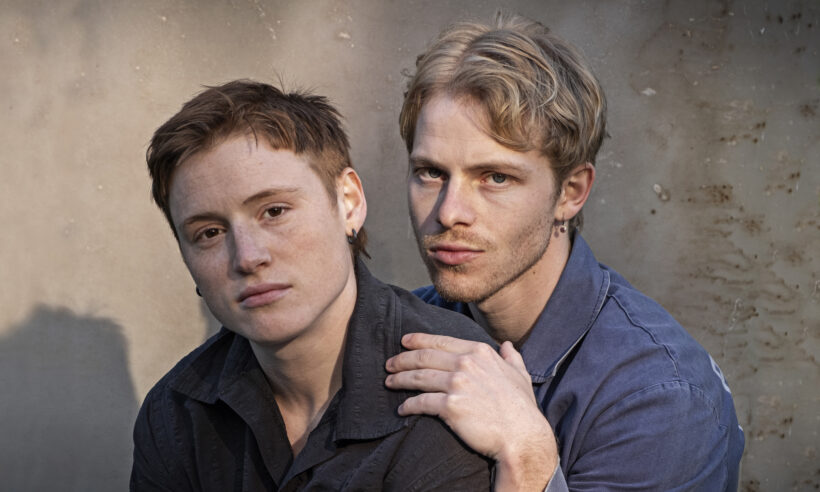John Stein and the folks at Project Publicity graciously provided the following.
Sauna is a bold and intimate reimagining of Romeo and Juliet that delves into themes of love, belonging, and identity within Copenhagen’s queer community. At its heart is the story of Johan, a gay man yearning for connection, and William, a trans man navigating the early stages of his transition. What begins as a Grindr hookup evolves into a profound bond that both heals and challenges them, set against the charged, transformative backdrop of a gay sauna.

“I had never seen a love story between a trans gay man and a cis gay man before,” says director Mathias Broe, who was eager to bring fresh perspectives to queer cinema. The film grapples with the universal questions faced by LGBTQ+ people while also reflecting Broe’s own life—his real-life partner began transitioning during the film’s production.
We sat down with Mathias Broe at his home in Denmark to learn more about the journey behind Sauna.
Sauna is your debut feature film, and it’s already groundbreaking as the first Danish film to cast a transgender actor in a leading trans role. What did it mean to you personally to be able to bring this kind of authentic representation to the screen?
MB: It means a lot to make space for the lives of people who are close to my heart. It’s always surprised me how little representation queer people have in cinema history. It’s my ambition to present my friends and characters from my community to the big screen.
The film is adapted from Mads Ananda Lodahl’s book. What drew you to his story?
MB: I fell completely in love with the characters in the book as well as the portrait of underground Copenhagen that Lodahl depicts. As a queer man in Denmark, I related to it.
It tells the story of a gay cis man and a trans man who fall in love.

MB: At its heart, the film is about Johan and William’s plea to understand one another. In relationships, people often project their own ideas onto the person they love, making it about them rather than their partner. Many of us lose ourselves in trying to please rather than actually seeing what’s needed. We need to learn to listen to our loved ones’ actual needs and boundaries. I’ve made that mistake.
You’ve shared that your own partner began transitioning while you were making Sauna. How did that experience influence your understanding of William and Johan’s love story?
MB: My partner and I used to do everything together. When she began her transition, suddenly, there were spaces she didn’t feel comfortable coming to.
There were also new ones that opened up to her, where I couldn’t join. It was a big change in our lives that seemed to blend in with the portrait of William and Johan.
What was it about Nina Rask that made you confident they were the right choice for the role of William?

MB: Nina really brought an undeniable charm and handsomeness that we needed for the role of William. William has his guard up to protect himself during his self-discovery, so we needed an actor who could soften the character. Because Nina is a comedian as well, it makes the character more accessible.
Magnus Juhl Andersen stands out as Johan, and the chemistry between him and Nina is undeniable.
MB: When casting for Johan and William, first and foremost, we needed to believe their chemistry. When we paired Nina with Magnus, they felt like lovers and not brothers. Magnus has a vulnerability that makes the audience want to explore his intentions.
The gay sauna serves as both a place of intimacy and rejection in the film.
MB: The book’s writer, Mads Ananda Lodahl, used to work in a gay sauna, so the sauna comes from his life.

As an arena, I felt like it was a very cinematic location, because it also works as a separatist space that is hard to enter. It becomes a place of desire and a home for Johan. For William, it’s an opportunity to explore his identity and sexuality, but it’s also a risky place where he’s put in a very vulnerable situation, and this becomes a catalyst for understanding the core of the film.
The film doesn’t shy away from addressing transphobia and prejudice within the LGBTQ+ community itself.
MB: Isn’t it interesting how much transphobia and prejudice there is within the LGBTQ+ community? It’s very counterintuitive in terms of the core political struggle we all face. We wanted to put up a mirror to show the hypocrisy.
What conversation do you hope the film sparks among audiences?
MB: If we don’t fight for one another’s rights, we’re just being dicks.

Exactly. It’s important to keep the unity in community.
MB: I hope the film opens a space for curiosity and empathy, not only within the queer community but also for a broader audience that may not typically move within queer spaces. By watching ‘Sauna’ and seeing people who they don’t usually see on screen be intimate, human, and relate to one another, I hope audiences will be more accepting and open to breaking the boxed-in limitations we set for ourselves.
Sauna is available to rent or own on all major digital platforms beginning November 18th.

